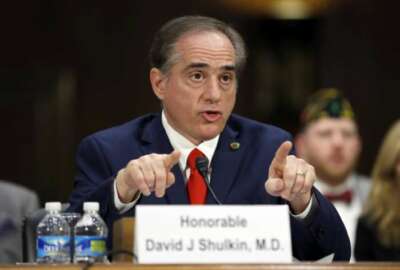
How different is the new VA accountability bill from other attempts? Depends who you ask
Some advocates of the House Veterans Affairs Committee's new employee accountability bill say it's different enough from previous attempts to tackle this issue and...
Some lawmakers think they have a solution now to a longstanding and often heated debate over employee accountability at the Veterans Affairs Department.
They say the VA Accountability First Act of 2017, which House Veterans Affairs Committee Chairman Phil Roe (R-Tenn.) introduced earlier this week, is a fresh approach that resolves past concerns with previous legislation — and serves as a tool that would make it easier for the VA secretary to fire or discipline employees.
But others see the legislation as an attempt to target specific past events and frustrations that Congress had with the department and the Merit Systems Protection Board.
“The big difference that we have this year that we didn’t have last year is that we have Dr. Shulkin,” House committee aides said. “This is something that we worked on with VA to come to a conclusion on the bill. The changes that have been made since [last year’s bill] mainly were at their insistence. They are supportive of what we’re trying to do.”
Shulkin himself said that employee accountability was one of his top 10 priorities for the coming year.
Lawmakers, unions and other experts say Roe’s bill is different from some previous attempts by the 114th Congress to address employee accountability. The VA asked Congress to support legislation that would move some of the department’s senior executives from Title 5 to Title 38. Former House committee Chairman Jeff Miller (R-Fla.) introduced legislation banning all executives from receiving performance bonuses.
Those suggestions are absent from Roe’s legislation. But lawmakers, unions and others appear divided on just how different the VA Accountability First Act is from those previous attempts.
The 2017 bill would give the VA secretary the authority to fire, demote or suspend the department’s employees for misconduct or poor performance. It requires the department to notify employees of a disciplinary action 10 days in advance. The secretary has another five days to complete the decision.
Employees would have seven days to appeal to the Merit Systems Protection Board. A MSPB administrative judge has 45 days to issue a decision, the bill said.
Employees can also appeal the administrative judge’s decision to the board itself. Currently though, MSPB lacks a quorum, and those decisions would have to wait until the President appoints at least one more board member.
“We’ve taken away any of the constitutional arguments that people had related to appointment clause,” committee aides said. “By putting the full MSPB back into the loop for all employees, we’ve taken care of that constitutionality issue.”
That issue sparked frustration among lawmakers, and the department itself, when the Justice Department last summer ruled a controversial provision in the VA Access, Choice and Accountability Act unconstitutional. VA in turn stopped using the expedited firing process.
Unlike current legislation and previous bills, there is no time limit on the board’s review, another piece that committee aides said should satisfy the concerns the other party had with previous legislation.
The legislation adds an option for the employee to appeal to the U.S. Court of Appeals for the Federal Circuit. But it eliminates grievance procedures VA employees had under their collective bargaining agreements as an option.
The American Federation of Government Employees, which represents many VA employees, sees that as a problem.
“They’ve tried to conceal the fact that they’re destroying court grievance rights for every VA employee,” said Marilyn Park, legislative representative for AFGE, which represents many employees at the department.
Roe’s legislation also shortens the time an employee would have to prepare his or her legal case, she added.
The committee said it’s an attempt to clear up a long and confusing appeals process.
“What we’re saying is this is going to be the singular way to appeal or dispute any of these major adverse actions — suspensions for longer than 14 days, demotions and removals,” committee aides said. “It doesn’t make any sense to have one, streamlined process to go through the MSPB while you also have another process to go through with grievance procedures.”
A former government executive with knowledge of the VA said this legislation would in fact make it easier for the secretary to fire employees.
“Not only will it make it easier to fire employees, it makes it easier for the department to impose penalties on employees fairly early on in the process,” the former executive said. “You’re shifting the weight on to the employee.”
The bill also lets the secretary cut retirement benefits for an employee convicted of a felony that influenced the person’s performance on the job. Employees can appeal these notices to the director of the Office of Personnel Management.
It addresses another, highly specific circumstance: employees who retire before the department issues a final removal or disciplinary notice. The bill would also let the secretary reduce an employee’s retirement annuity in this situation.
The secretary could also request that employees repay all or part of their bonuses, awards or relocation incentives if the department later learns of their poor performance or misconduct and determines “that such award or bonus would not have been paid, in whole or in part, had the misconduct or poor performance been known prior to the payment,” the bill said.
“Why would I come work at an agency when bonuses can be taken away from me and relocation incentives can be taken away from me,” Park said.
Yet the committee doesn’t view the provision as one that prevent the department from recruiting new or existing employees to other positions or locations.
“We’re saying that you had to have done something bad to have gotten that relocation bonus in the first place,” the aides said.
Others say the bill offers few details about the circumstances that VA could ask an employee or executive to repay his or her bonus, which could spark tough legal battles in the future.
“It’s fairly vague about what constitutes violations that would warrant the clawing back of these funds,” the former government executive said. “It doesn’t provide a threshold… and that’s a problem.”
And similar to current legislation and previous attempts to make it easier for the VA secretary to fire poor performers, legal questions could arise if Congress passes the 2017 bill.
“This is not clean,” the former executive said of the bill. “This is a political thing, and whenever you have political fixes, they might work in the short term but not in the long term.”
The former executive also questioned what message the bill may send internally to VA employees. President Donald Trump himself promised he would take action “to make the VA great again” during his campaign.
“That might work well with the administration and might work well with some of the members of Congress, but with VA, it’s not going to go very far,” the former executive said.
The aides said they expect the legislation to move easily through the committee at the bill’s markup March 8, and they’re hopeful it will pass the House. Sen. Marco Rubio (R-Fla.) introduced a companion to the Accountability First Act earlier this week.
“There’s some folks that don’t want us to touch any of this at all at any point. That’s their right to think about that,” they said. “Leadership is interested in the bill. We don’t know exactly when it will move through, but I expect it will be soon after we get it out of markup.”
Copyright © 2025 Federal News Network. All rights reserved. This website is not intended for users located within the European Economic Area.
Nicole Ogrysko is a reporter for Federal News Network focusing on the federal workforce and federal pay and benefits.
Follow @nogryskoWFED





